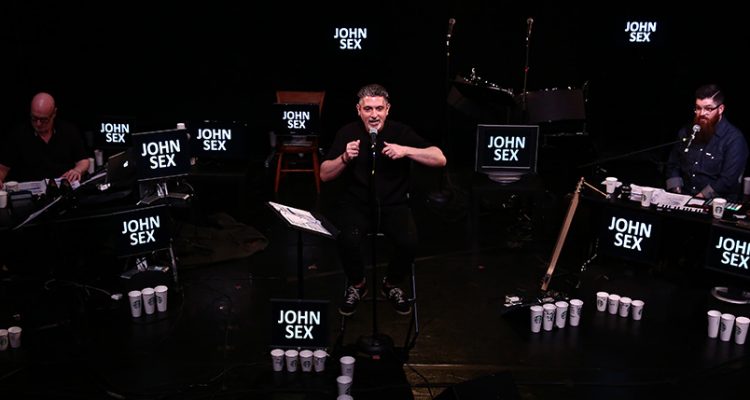It’s a running joke of the mainstream, the inability for Starbucks employees to correctly spell and write out a name across one of their coffee cups. Especially, as actor, director and writer Ain Gordon tells, for a man named Ain. It was during one of his regular coffee stops that he discovered an opportunity to remember the names that have been lost. His performance, “Radicals in Miniature,” which was performed at the Regina A. Quick Center for the Arts on Feb. 24 with partners Josh Quillen and Ed Fitzgerald, was all about telling the stories of the dead, telling us an alternate running titles was, “People I Know Who Died.” But, in that coffee shop, Gordon told the barista to call him Sam. Sam, the name of his long dead Grandfather. Then, not only was Ain able to easily walk off with a nice cup of coffee without any confusion, but a name that hadn’t been heard in years was read out by a Starbucks Barista. In more practical terms, this opening story allowed all of us in the audience to finally know why there were so many empty coffee cups strewn around the stage.
It wasn’t only coffee cups. The Lawrence A. Wien Experimental Black Box Theatre, small and dark and only able to seat a classroom size of people, was decorated with 14 various sized computer monitors that projected a seemingly random assortment of images. As we sat and waited, the lights dimmed and Gordon, a later middle aged man with greying hair speckled throughout his curled black hair, began and successfully completed a mission of remembering the insignificant, and of all the miniscule details of those who have died. Those who, on paper at least, mean less to Ain than his Grandfather. He first introduced us to John Sex.
All Gordon could remember about his first and only encounter with John Sex was his jump off a stage at the Mud Club, a hot spot for the youth of New York City in the 1970’s, and Sex’s hand grabbing Gordon’s butt. That’s it. Any of the other information shared or shown to the audience through the computer monitors, was, as Gordon’s partner Josh Quillen whispered through the microphone, “Googled.” Gordon, who was 16 at the time of his meeting, didn’t remember what everyone else knew about Sex: his erect hair, eccentric cabaret routines often performed with his pet snake Delilah or his untimely death from AIDS at the age of 34. All he remembered was his electric personality and that launch from the stage.
The story continues on as the audience is introduced to character after character in Gordon’s life. We hear about Lou Plotnick, who Gordon only remembers through his all weather three button suit, as Gordon wears said three button jacket to reveal more information about Plotnick. All the substantial information, the fact that Plotnick and his wife Maud separated at some point and exactly which house they lived in just outside the NYC, all that information was “Googled.”
Quillen also supplied his own stories of remembrance. One of which was that his mother grew up with a man named, Brad Dinolfo, who was best known for his ability to sneak into Ohio State games dressed as one of the Marching Band members and simply join in with the rest of the band though he, at the time, could’ve been the father to many of the band’s members. Dinolfo, who lived in an era that was unsupportive of homosexuality – as Quillen’s mother recalls, “We just didn’t talk about it,” was known to order Elizabeth Arden makeup in town. Even though Quillen’s mother kept quiet about the whole ordeal, Dinolf was still murdered and castrated in his bar by a kid Quillen grew up with.
It feels magical, that just as Gordon, Quillen and their third partner Ed Fitzgerald, created this show to solidify the names of those not often remembered. I too am writing their names out and archiving them forever in the Mirror. This story will play just a small part in continuing on the memories of those forgotten, those not easily remembered by the masses. Even if all we’re doing is reading out their names from Starbucks cups and discussing the seemingly insignificant details from the massive span of time that is life. We are remembering.


Leave a Reply